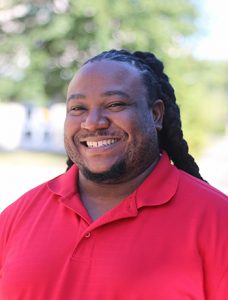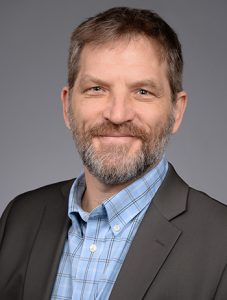Published on
Morrell “Mo” Whitley, International student adviser, International Programs

One of the first things to be affected by the pandemic was international travel. News and travel restrictions changed quickly as the pandemic gradually spread around the world, and Mizzou International Programs had to stay on top of this. Morrell Whitley is one of the International Student Advisors who deals directly with international students. He said, “There’s no question that with pandemic coming to boom in spring 2020, it brought quite a few challenges. The challenge of providing the best possible assistance to our students via Zoom from different countries, embassies around the world closing, and travel restrictions for our students, to name a few. However, the biggest challenge was waiting for and working with the ever-changing immigration policies and regulations.”
Luckily, Morrell, also known as “Mo,” had plenty of expertise. David Currey, director of International Student and Scholar Services (ISSS) and Kristen Colbrecht, assistant director of International Student and Scholar Services, nominated him as an “un-sung hero” of the Mizzou community:
“Mo is an exceptional and highly experienced ISSS adviser, with more to show than mere ‘book’ or ‘regulatory’ knowledge. Including his previous employers, he has over ten years’ experience in the field of international education and student advising. During the pandemic our office relied heavily on his accuracy, efficiency and responsiveness to ensure F-1 and J-1 students were in compliance and also strongly supported with their plethora of regulatory changes.” He is also a member of NAFSA’s Trainer Corps program, so he is certified to train other new professionals in the field on issues surrounding F-1 and J-1 international students.
Mo also relied on other colleagues from International Student and Scholar Services. He says, “We went into this pandemic with lots of uncertainty about how this would impact our students, and while it wasn’t always easy, we are coming through still as strong as we were going in!” Luckily, in-person advising and events have resumed, because, as he says, “We enjoy being able to personally welcome our students to campus and we have a community of volunteers who are always ready to be friendly & welcoming faces to help us make our students feel welcomed.”
“As a team member, you couldn’t ask for a more authentic, genuine and considerate colleague,” Mo’s nomination states, and “Mo is quick to say yes to activities and projects that support our community and always has a smile to share. His sense of humor has lightened some of the more difficult days during the pandemic and our team is beyond grateful to work with him.” Students who come to his office for advising also have the treat of seeing his extensive bobblehead collection.
The experience of 2020 taught Mo that, “even through the tough and uncertain times, we can still provide quality service to students from all over the world as long as we do it together.” Teamwork and a positive attitude from his department helped many students from all over the world feel at home at Mizzou, even during an uncertain and anxious time.

James Van Dyke, Associate Professor, School of Visual Studies & Director of Graduate Studies
The Humanities Series is a four-semester long, interdisciplinary series of courses offered to Honors College students. Students attend guest lectures and participate in small group discussion with Honors College faculty. In this faculty highlight, we focus on James Van Dyke, Associate Professor in the School of Visual Studies and former Honors College faculty in the Humanities Series. His research is on modern European art, specifically twentieth-century German painting and politics. Rachel Harper, Associate Director of the Honors College, says, “Not only is Jim’s work on 20th century artists like Paul Klee, Anselm Kiefer, and Gerhard Richter important both culturally and academically, but Jim’s lecturing and teaching easily make him one of the best faculty on MU’s campus.”
Since coming to MU in 2010, Van Dyke has taught a variety of courses for the Honors College. He says, “In the Humanities Series, I have lectured on Baroque art and propaganda, on Manet and modernity in Paris in the mid-nineteenth-century, and on the emergence of the avant-garde in early-twentieth-century Europe (looking closely at the network of relationships between the painters Picasso and Matisse, and the writer and art collector Gertrude Stein).”
In a previous Honors College course, he team-taught a course on color with two other faculty members. This course turned out to be a learning experience for everyone:
“In the color course, we all became keenly aware of how little we knew while learning so much about the extraordinary complexity of color – that was an experience both profoundly challenging and incredibly exciting! The students who participated in it were great – engaged and hard-working, inquisitive and thoughtful, challenging and, when necessary, patient. And that has always been my experience with Honors College students over the years.”
Regarding a lecture Van Dyke did on Manet and Modernism for the Honors College in 2013, Harper says, “What the students, not to mention the faculty, loved about his talk—aside from Jim’s energy and infectious enthusiasm—was the way it gave them a framework to understand modern art yet still allowed them an interpretive place-to-stand, so to speak, that depended more on what and how they saw, than on their (lack of) knowledge about 20th century art”.
Van Dyke is also enthusiastic about his experience working with staff and faculty at the Honors College, saying, Harper “is an amazing colleague who manages to both teach with inspiration and to manage the complex logistics of that course with aplomb.” The program brings together faculty from many different disciplines, making up “a passionate, critical, collegial community of learning. That’s what it’s all about!”